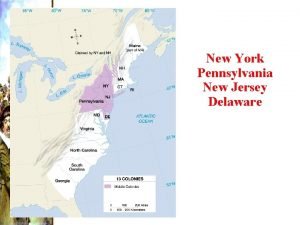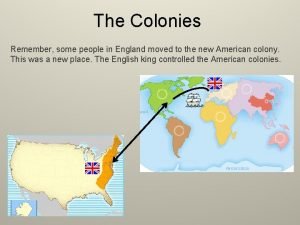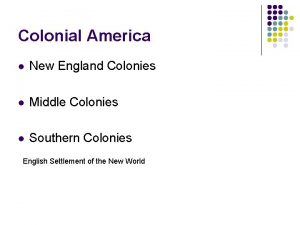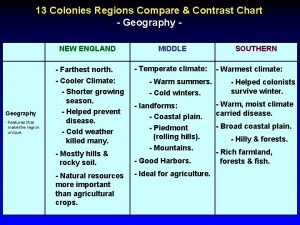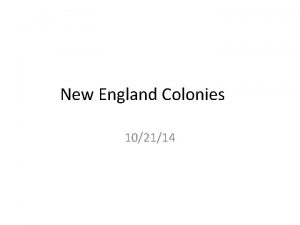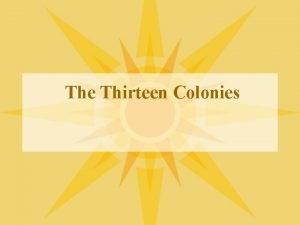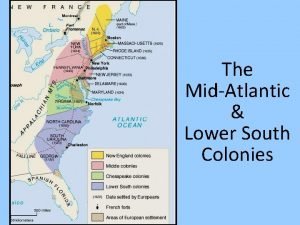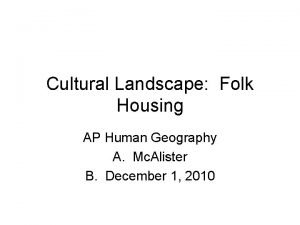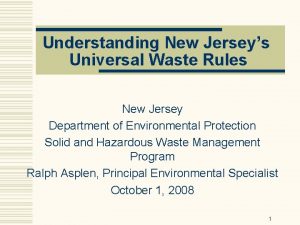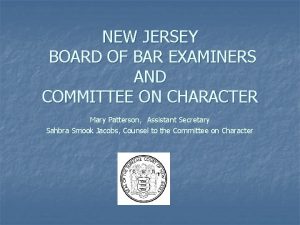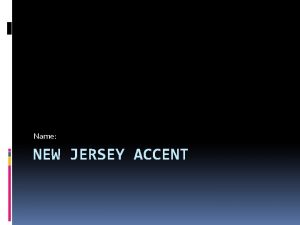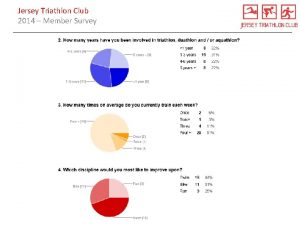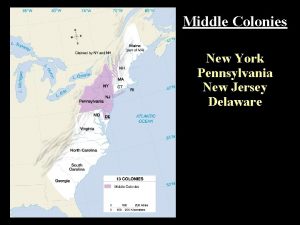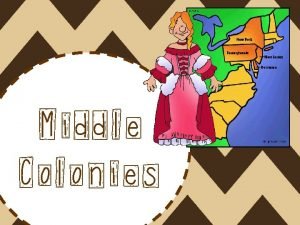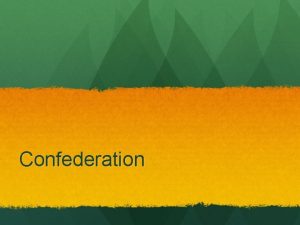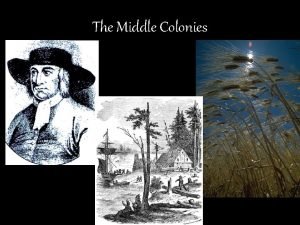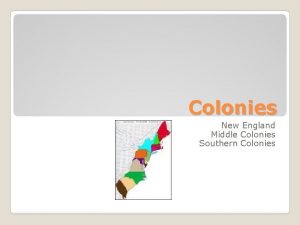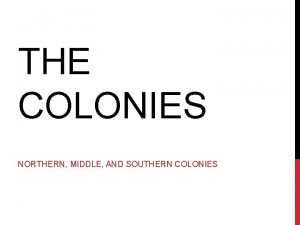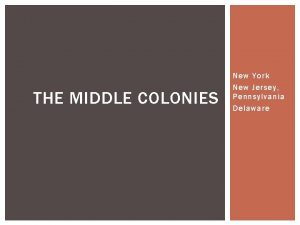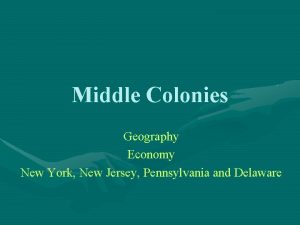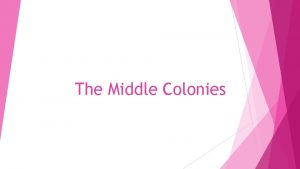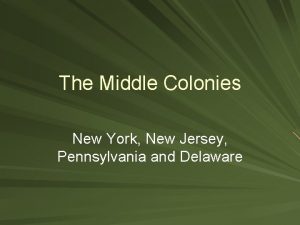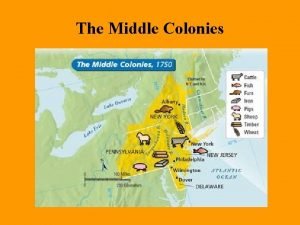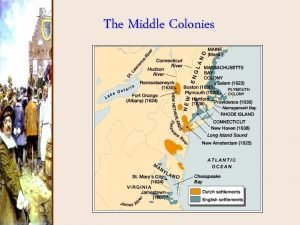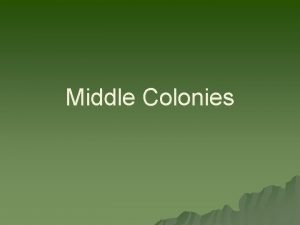The Middle Atlantic Colonies Delaware DE New Jersey


















- Slides: 18

The Middle Atlantic Colonies Delaware (DE) New Jersey (NJ) New York (NY) Pennsylvania (PA)


Some Background Information… The climate in the Middle Atlantic was good for crops like wheat and corn. They made so much bread from the wheat this region was nicknamed “The Breadbasket Colonies!”

The Breadbasket Colonies Lesson 1

New Netherland Not long after the English started colonies, the Dutch (from Holland) began to build settlements. Henry Hudson claimed parts of New York, New Jersey and Delaware for Holland back in 1609. In 1626 the Dutch began building a fort on Manhattan Island. The Dutch called this land (city) “New Amsterdam. ” This land is now New York City!

New Netherland became the colony of New York. New Amsterdam became the city of New York City.

The Dutch allowed settlers from many countries like France, Italy and Spain. People that were of the Jewish faith started to settle in New Amsterdam. BUT Jews did not have the same rights Christians had.


New Netherland Becomes New York New Netherland’s capital city was New Amsterdam. In 1646 the Dutch West India Company appointed Peter Stuyvesant as “director general” of New Netherland was in trouble because the government was having problems, and the settlers were fighting. Stuyvesant started to solve these problems, but he would not let the colonists have a voice in the government.

King Charles II of England thought the Dutch were getting too powerful/ crowded so England declared war on the Dutch. King Charles II told his brother the Duke of York, he could have all the Dutch colonies if he captured them. England got what they wanted, and Stuyvesant had to give up the colony to the English. The English took control of New Netherland split it into “New Jersey” and “New York. ” Peter Stuyvesant

New Jersey The Duke of York hired people to sell his new land to colonists who were willing to settle in North America. A group of people that moved to New Jersey were the Quakers. Edward Byllinge was a Quaker leader. Quakers believe violence is always wrong so they refuse to carry guns or fight. Quakers left England because they refused to fight for the king. They hoped to find refuge in New

Quaker company agrees with Quaker values.

Pennsylvania and Delaware King Charles II gave a charter to William Penn (he was a Quaker). The English king granted the charter because he owed Penn’s father a favor. Pennsylvania means “Penn’s Woods. ”

Penn was responsible for the government in his colony. In 1682 Penn wrote a document called: “The Frame of Government of Pennsylvania. ” A general assembly (a group of citizens) made laws. Citizens had freedom of speech, religion and a fair trial by jury.

Penn also had good relationships with Indian tribes in the area. William Penn also became the owner of Delaware. Penn granted them their own general assembly.

Market Towns Most people in the Middle Atlantic Colonies made their money by farming. Farmers depended on market towns as places to trade their surplus produce and livestock (food animals). Markets sold other goods too like cloth, shoes, lumber and buttons. Nearby a mill was where grain was ground into flour.


In general the Middle Atlantic Colonies were more welcoming of different religions. Most towns had more than one kind of church and people became interested in other religions. During the 1730’s and 1740’s a period of time called “The Great Awakening” called for a rebirth of the religious ways of life.
 New york, new jersey, pennsylvania, and delaware
New york, new jersey, pennsylvania, and delaware New england region
New england region Site:slidetodoc.com
Site:slidetodoc.com Northern middle and southern colonies venn diagram
Northern middle and southern colonies venn diagram Comparing colonies chart
Comparing colonies chart New england, middle and southern colonies comparison chart
New england, middle and southern colonies comparison chart The mid atlantic colonies
The mid atlantic colonies Lower south colonies
Lower south colonies The middle colonies
The middle colonies Folk house ap human geography
Folk house ap human geography Universal waste label
Universal waste label New jersey space grant consortium
New jersey space grant consortium Nj driver manual
Nj driver manual Appalachian ridge and valley new jersey
Appalachian ridge and valley new jersey New jersey center for teaching and learning
New jersey center for teaching and learning How many total squares are there
How many total squares are there New jersey bar application
New jersey bar application New jersey accent
New jersey accent Jersey tri club
Jersey tri club
